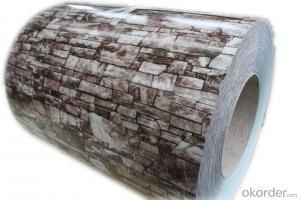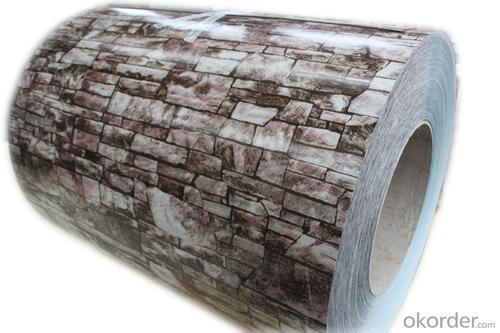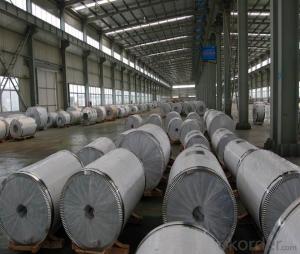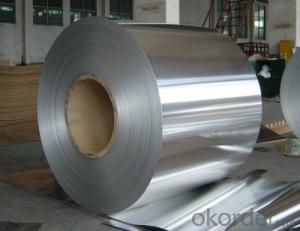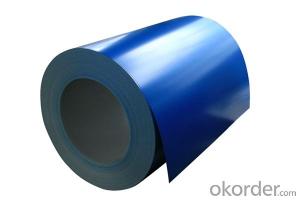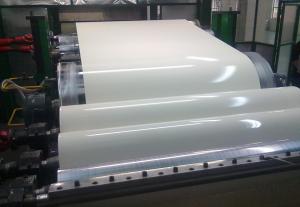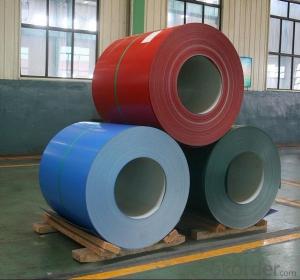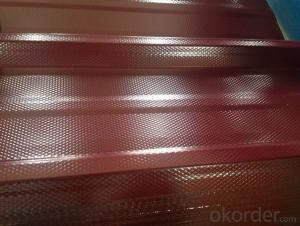Fascia Aluminum Coil for Roofing Application - Aluminum Color Coated Coil
- Loading Port:
- Shanghai
- Payment Terms:
- TT OR LC
- Min Order Qty:
- 5 m.t.
- Supply Capability:
- 2000 m.t./month
OKorder Service Pledge
OKorder Financial Service
You Might Also Like
Specification
Structure of Aluminium Color Coated Coil for Roofing Application Description:
Coated aluminum coil/sheet are of a wide range of colors, which gives wonderful appearance no matter in residential and commercial constructions of great exhibition centers.
The coated aluminum coil/sheet have been widely used in the fields of construction and decoration( garage doors, ceiling etc.), electronic appliances, lighting decoration, air-condition air pipes, sandwich panels and drainages etc.
Main Features of the Aluminium Color Coated Coil for Roofing Application:
1) High flexibility
2) Impact resistance
3) Excellent weather-proof durability
4) Anti-ultraviolet
5) High erosion resist
Images of the Aluminium Color Coated Coil for Roofing Application:
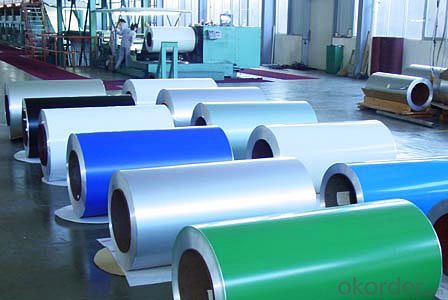
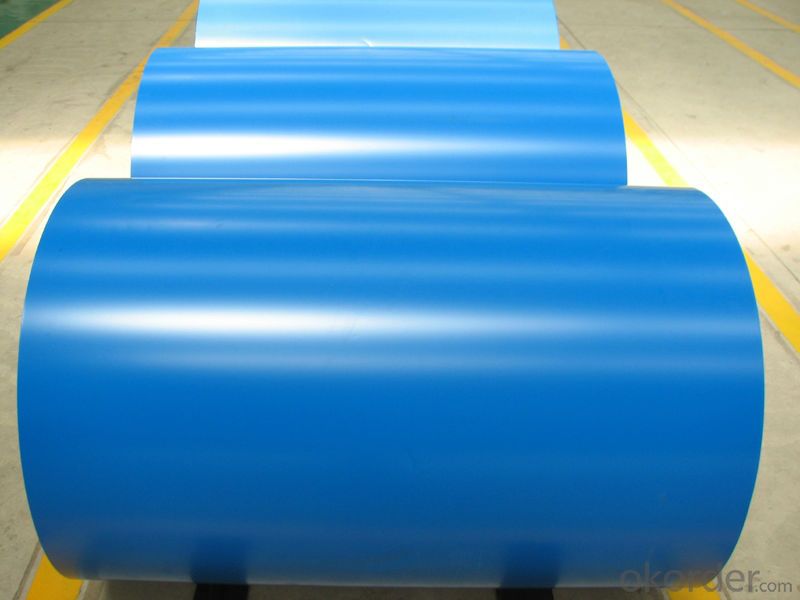
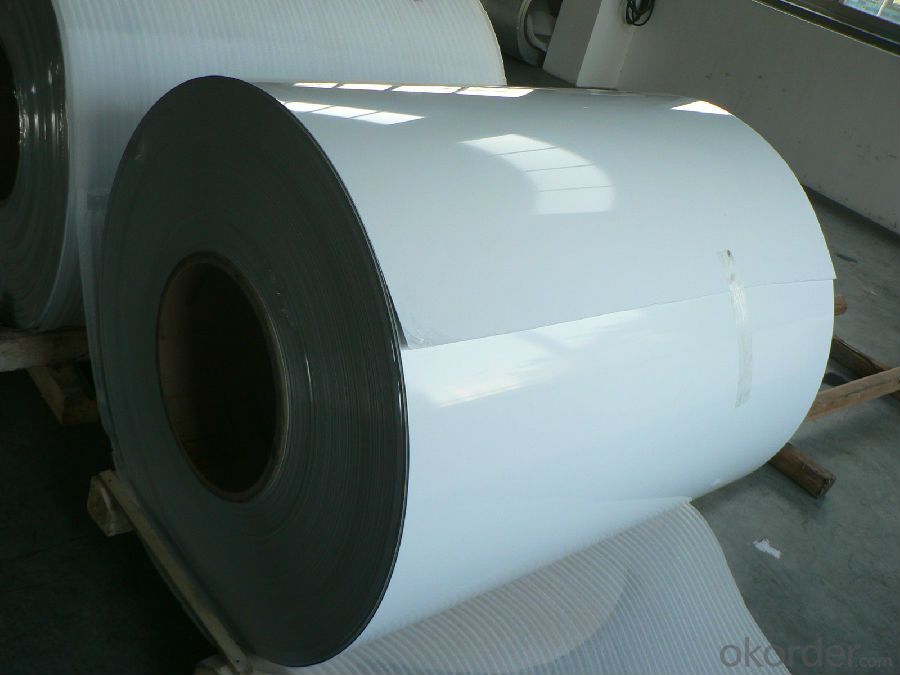
Aluminium Color Coated Coil for Roofing Application Specification:
Alloy | A1100,A3003,A1050,A8011 etc |
Temper | H16,H18,H24 |
Thickness | From 0.024mm to 1.2mm |
Width | Standard width:1240mm |
Special width:1300mm,1520mm,1570mm,1595mm | |
Diameter | Standard dia:1200mm |
Interior dia:150mm,405mm,505mm | |
Weight | 2.5 T/coil,3.0 T/coil |
Coating | PE, PVDF, AC |
Surface | Embossed, mill finish, coated |
Color | AS to code RAL |
Gloss | 10-90%(EN ISO-2813:1994) |
Coating Thickness | PE: more than 18 micron |
PVDF: more than 25 micron | |
Coating Hardness (pencil resistance) | More than 2h |
Coating adhesion | 5J(EN ISO-2409:1994) |
Impact Resistance | No peeling or cracking(50 kg/cm,ASTMD-2794:1993) |
Flexibility (T-bend) | 2T |
MEK resistance | More than 100 |
FAQ:
a.What is monthly capacity
---CNBM is one stated own company and our monthly capacity is about 2000tons.
b. Now which countries do you export your goods?
---Now we export to South East Asia,Africa, North America,South America ect.
- Q: Are there any environmental benefits to using aluminum coils?
- Yes, there are several environmental benefits to using aluminum coils. Firstly, aluminum is a highly sustainable material as it is 100% recyclable without losing its original properties. This means that using aluminum coils helps reduce the demand for mining and extracting new raw materials, reducing the environmental impact associated with these processes. Additionally, recycling aluminum requires only about 5% of the energy needed to produce primary aluminum, resulting in significant energy savings and reduced greenhouse gas emissions. Moreover, aluminum coils have a longer lifespan compared to other materials commonly used in coils, such as copper or steel. This durability means that fewer coils need to be manufactured and replaced over time, resulting in less waste generation and lower overall environmental impact. Furthermore, aluminum is corrosion-resistant, which eliminates the need for additional treatments or coatings that may contain harmful chemicals. This reduces the release of potentially hazardous substances into the environment during the manufacturing and use of aluminum coils. Lastly, aluminum is lightweight, which contributes to lower transportation costs and energy consumption during distribution. This aspect decreases fuel consumption and associated emissions, reducing the overall carbon footprint of using aluminum coils. Considering these factors, the use of aluminum coils provides significant environmental benefits, including reduced resource extraction, energy conservation, waste reduction, and lower emissions.
- Q: How are aluminum coils protected against UV degradation?
- Aluminum coils are commonly protected against UV degradation through the application of protective coatings or treatments. These coatings act as a barrier between the aluminum surface and the harmful ultraviolet (UV) rays from the sun, preventing them from causing damage or degradation to the metal. One common method of protection is the application of organic coatings, such as polyvinylidene fluoride (PVDF) or polyester coatings. These coatings are specifically formulated to provide excellent resistance against UV radiation. They form a durable and protective layer on the surface of the aluminum coil, shielding it from the harmful effects of prolonged sun exposure. Another method is anodizing, which involves an electrochemical process that creates a protective oxide layer on the aluminum surface. This oxide layer acts as a barrier against UV rays and prevents them from reaching the underlying metal. Anodized aluminum coils are known for their excellent resistance to UV degradation and are commonly used in outdoor applications where long-term durability is required. In addition to these protective coatings and treatments, aluminum coils can also be designed with specific alloy compositions that enhance their resistance to UV degradation. Certain alloy elements, such as magnesium and manganese, can improve the natural ability of aluminum to withstand UV radiation. These alloy additions increase the overall durability and UV resistance of the aluminum coil, minimizing the potential for degradation over time. Overall, the protection of aluminum coils against UV degradation is a critical consideration in applications where the coils are exposed to sunlight. By utilizing protective coatings, anodizing, or selecting appropriate alloy compositions, manufacturers can effectively safeguard the aluminum coils and ensure their long-term performance and durability even in challenging outdoor environments.
- Q: Are there any specific guidelines for the handling of aluminum coils?
- Yes, there are specific guidelines for the handling of aluminum coils. These guidelines typically include proper lifting techniques, the use of appropriate equipment such as cranes or forklifts, and ensuring that the coils are stored in a clean and dry environment to prevent corrosion. It is also important to handle the coils gently to avoid any damage or deformation.
- Q: What is the maximum yield strength of aluminum coils?
- The maximum yield strength of aluminum coils can vary depending on the specific alloy and temper, but it typically ranges between 15,000 and 50,000 pounds per square inch (psi).
- Q: Is it possible to utilize aluminum coils in the automotive industry?
- <p>Yes, aluminum coils are widely used in the automotive industry. They are employed in various applications such as engine parts, heat exchangers, and body panels due to their lightweight, corrosion resistance, and high strength-to-weight ratio. Aluminum's recyclability and energy efficiency in production also contribute to its popularity in vehicle manufacturing.</p>
- Q: Why does it take less energy to get aluminum metal from used cans than to get it directly from the ore?
- in order to extract the raw aluminum, you have to heat everything and melt it first, then remove the stuff that precipitates out as it cools or forms via chemical reaction with catalysts you introduce. With aluminum cans, you don't have to raise the temperature much above the melting point of aluminum, since it's already the substance in the can with the highest melting point. With aluminum ore, there can be anything in the ore with pretty much any melting point. In particular, if the ore contains an alloy of aluminum and a metal with a higher melting point than aluminum, then rest assured, you will have to raise the temperature of the ore above the melting point of aluminum in order to melt that alloy, In any case, because the maximum required temperature of the smelter needed to melt used aluminum cans is necessarily lower than the maximum temperature required to work with the ore, less energy is required to get aluminum from used cans than from ore.
- Q: What are the different surface treatments applied to aluminum coils?
- There are several different surface treatments that can be applied to aluminum coils to enhance their appearance, protect against corrosion, and improve their overall performance. Some of the most common surface treatments for aluminum coils include: 1. Anodizing: Anodizing is an electrochemical process that forms a protective oxide layer on the surface of the aluminum. This treatment enhances the corrosion resistance of the coils and provides a decorative finish. Anodized aluminum coils are available in a wide range of colors and finishes. 2. Painting: Painting is a surface treatment that involves applying a coating of paint to the aluminum coils. This treatment provides a decorative finish and can also enhance the corrosion resistance of the coils. Painted aluminum coils are commonly used in architectural applications where aesthetics are important. 3. Laminating: Laminating is a process that involves applying a thin layer of protective film to the surface of the aluminum coils. This treatment provides a protective barrier against scratches, abrasion, and UV radiation. Laminated aluminum coils are often used in applications where durability and weather resistance are important. 4. Polishing: Polishing is a mechanical process that involves buffing the surface of the aluminum coils to create a smooth and shiny finish. This treatment enhances the appearance of the coils and can also improve their corrosion resistance. Polished aluminum coils are commonly used in decorative applications where a high-end look is desired. 5. Brushing: Brushing is a mechanical process that involves creating a pattern of fine parallel lines on the surface of the aluminum coils. This treatment gives the coils a brushed or satin finish and can also help to hide imperfections and scratches. Brushed aluminum coils are often used in applications where a modern and sleek appearance is desired. Overall, the choice of surface treatment for aluminum coils depends on the specific application requirements and desired aesthetic. Each treatment offers unique benefits in terms of appearance, corrosion resistance, and durability, allowing manufacturers and designers to select the most suitable option for their needs.
- Q: Can aluminum coils be used in the production of automotive heat shields?
- Automotive heat shields can indeed utilize aluminum coils. The reason behind aluminum's popularity as a heat shield material lies in its remarkable thermal conductivity and heat resistance characteristics. By utilizing aluminum coils, heat shields can be crafted to be both lightweight and durable, effectively diverting and reflecting heat away from crucial components within the automotive system. Furthermore, the flexibility of aluminum coils enables them to be easily molded and shaped, ensuring a perfect fit for any automotive application.
- Q: This is not for around the house. It is for my lab. I am pretty sure these one wires are Aluminum, but I need the connector they were made with and the power cable is copper. Would it be okay to still try to join the two.
- yes but use wire nuts
- Q: * How is hitting with a aluminum Wiffle Ball feel and work out?* Did you like the results you had hitting with a aluminum Wiffle Ball bat?
- I've used an aluminum Wiffle bat and it really feels a lot better to hit with than the yellow plastic number. The Aluminum bats are still super light, but there is a bit of weight to it, and that weight is kind of end-loaded, which you can really feel as you turn your wrists over. The net result is a swing that feels more like a real bat with the barrel whipping through the hitting zone instead of that flyswatter feel you get with the regular bats. Oh, and you definitely get more distance when you connect. Definitely. I actually played in a Wiffle Ball tournament a few years ago and used those bats. Someone said that they no longer make them or they've been outlawed or something along those lines.
Send your message to us
Fascia Aluminum Coil for Roofing Application - Aluminum Color Coated Coil
- Loading Port:
- Shanghai
- Payment Terms:
- TT OR LC
- Min Order Qty:
- 5 m.t.
- Supply Capability:
- 2000 m.t./month
OKorder Service Pledge
OKorder Financial Service
Similar products
Hot products
Hot Searches
Related keywords
